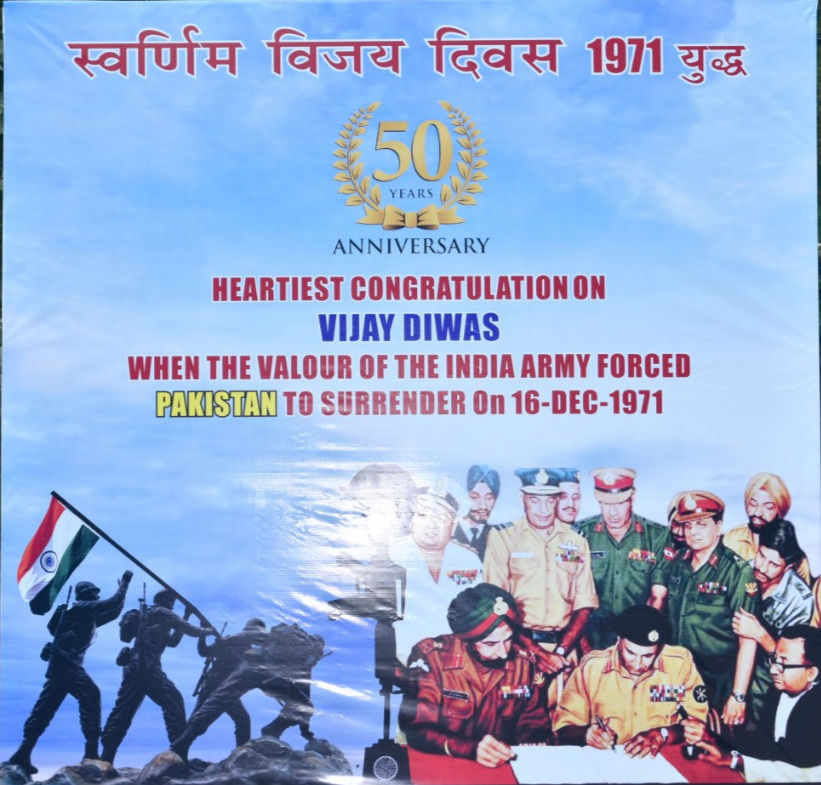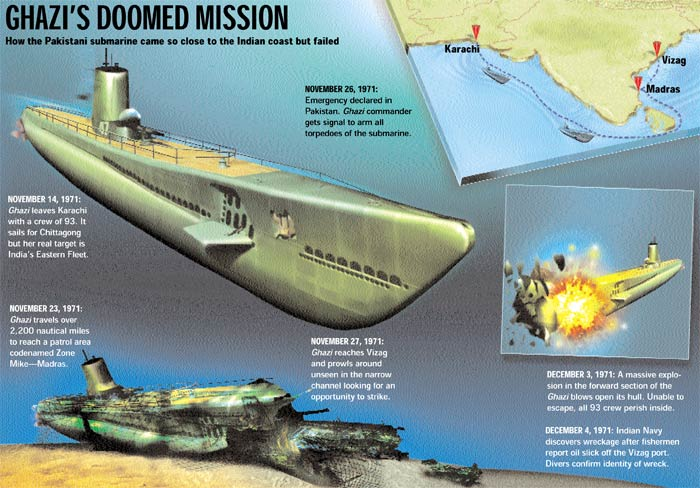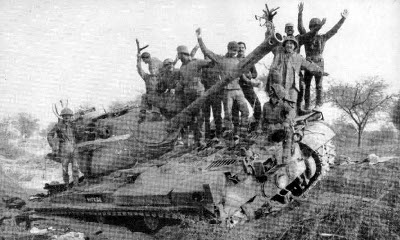
In December 1971, the world saw India’s blitzkrieg approach to secure a decisive and historic victory over the Pakistan Army which led to creation of Bangladesh. The outcome of this war was not just creation of a country but also one of the largest military surrender the world had ever seen. Such a textbook style execution by the Indian Armed Forces was an organized effort by all the three services, Indian Army, Navy and Airforce along with Mukti Bahini. With an aim to showcase this great victory, the nation started the 50th anniversary celebrations of Swarnim Vijay Varsh on 16 December 2020.
The initial causes for the Bangladesh Liberation war were - the ignorance of Yahya Khan during 1970 floods and cyclone Bhola. This led to a massive victory of Sheikh Mujibur Rahman’s Awami League against PPP of West Pakistan. However, he was denied the post of Prime Minister and was jailed. This was followed by a series of protests and Awami League started to operate as a quasi-government. On the night of 25 March 1971, almost 09 months before Bangladesh got its Independence, the military junta based in West Pakistan led by Yahya Khan launched Op Searchlight against the people of East Pakistan. It was a systematic elimination of scholars, intelligentsia, students, Bengali nationalists and armed forces personnel. The next day from a clandestine location, Sheikh Mujibur Rahman proclaimed in the radio that Bangladesh was now Independent. The liberation movement was spearheaded by Sheikh Mujibur Rahman after his historic speech on 07 March 1971. From 07 March to 25 March, Gen Tikka Khan (“The Butcher of Bengal”) was given charge of a Genocide. In order to stop the protests Pakistan Army and the militias created one of the biggest and most ruthless genocide against the Bengali civil population. 3-4 lakh killed and 2-4 lakh women were raped by the Army and militia.

By the end of April 1971, over 10 million Bangladeshi refugees fled to India. The plight of these people was brought into international spectacle at UN conferences by Prime Minister Shri Indira Gandhi. The Indian armed forces avoided the months of monsoon for tactical reasons to launch an offensive. However, this gave time for mobility of forces along the eastern and western borders. On 3 December 1971, Pakistan launched a pre emptive strike on Indian air bases at the western front. Indian armed forces replied with a full-blown attack on both the fronts. The famous battles of this war were- Battle of Chamb, Basantar, Longewala and Hilli. The Indian Navy achieved naval superiority after destruction of PNS Ghazi in Chittagong and attack on Karachi Port in Operation Trident. The Indian Airforce also played a crucial role by destroying Pakistan’s offensive.

On 16 December 1971, the historic masterpiece portrait of Lt Gen AAK Niazi signing the instrument of surrender along with Lt Gen Jagjit Singh Aurora sitting beside him, was created. 93000 Pakistani soldiers surrendered to the Indian armed forces and Pakistan was divided into half. Nearly one-third of its army was in captivity. Ever since Pakistan has been trying to cope with the embarrassment. Pakistan had lost its geostrategic advantage of becoming a port country when it lost Bangladesh. Chain of Pearls by Pakistan towards India has become a distant reality. After the war, the world accepted the new balance of power and recognized India as a dominant player in South Asia. Ideologically, the authenticity of Two Nation Theory was disproved by the war that muslim nationality was insufficient to keep the Bengali muslims together.
Honour, Honesty, Valour and Loyalty were the code of chivalry among the Indian armed forces and this code was the prime weapon in the whole war. Arms are just machines, it’s a soldier who is the weapon. The Indian soldiers fought for the honour of the people in a foreign land who were the sufferer of genocidal rape and massacre. A total of 1313 Indian soldiers won gallantry awards for the fourteen days war and what’s more, 93000 Pakistani soldiers surrendered unconditionally at the same time. Such an asymmetric loss by Pakistan was on the hands of all those who fought and those who never came home, those who led such men and those civilians of Bangladesh who fought for their liberation. Although over 600 officers and men of the Indian Army were decorated with gallantry awards, the three recipients of Param Vir Chakra were Lance Naik Albert Ekka: 14 Guards, Second Lieutenant Arun Khetarpal: 17 Poona Horse and Colonel Hoshiar Singh: 3 Grenadiers.
Every year on 16 December the nation celebrates Swarnim Vijay Divas. Meaning ‘Golden Victory Day’ in Sanskrit, the Indian victory in the 1971 war was engraved in gold and went down in the annals of world history. Swarnim Vijay Varsh marks the 50th anniversary of the occasion. The nationwide commemorative celebrations commenced at National War Memorial, Delhi on 16 December 2020 and will conclude in December 2021. As a part of the celebrations, the Prime Minister Shri Narendra Modi handed the Victory Flame over to the Indian Army on 16 December 2020, which was carried all across India. The flame is a hallmark of the Code of Chivalry of the Indian gallant soldiers. Veterans were felicitated all over the country giving a message to the youth of the valour and sacrifices made in the war. The Flame reached every corner of the country commemorating the soldiers in their hometowns. Military institutions and schools such as Sainik Schools, Rastriya Military Schools, etc had also conducted events with alumni veteran torch-bearers. A metaphor in itself, the flame of Nationalism is being carried to the hearts and minds of the people by heroic torch-bearers of the society.

India had demonstrated prowess in the air, over land and in the sea in front of the entire world leading to its superiority in the South Asian military power bloc. The war changed the geo-political landscape of the South Asian region, forever. The world has seldom seen a war fought to protect dignity of humanity and democracy and not to acquire territory or grab power. The 50th anniversary of the 1971 victory, Swarnim Vijay Varsh should be a reminder of Indian Chivalry to the people of India. And to the countries involved in disturbing our harmony, it should remind them of the dire statistics of 1971.
Best Golgappa packet for Your Home Cravings
Download or Save YouTube Thumbnail from Any Video
Doryang Instruments Supplier in China: Metal Detector
Solar Panel Price in Pakistan